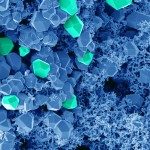Présentation
Expanding the genetic code beyond the A-T/G-C Watson-Crick canonical base pairs and 20 amino acids of
natural organisms is a long standing goal in synthetic biology. Reprogrammation of the genetic code can
lead to the formation of nucleic acids and proteins with hitherto unknown physico-chemical and structural
properties. In the field of nucleic acids, most efforts have focused on the creation of synthetic nucleotides
equipped with artificial nucleobases that are capable of forming a third, unnatural base pair (UBP). However, UBPs are associated with some limitations including poor solubility and absorption of near-visible light. We try to circumvent these shortcomings through the enzymatic construction of metal-UBPs. The ultimate aim of this proposal is to isolate synthetic genetic polymers extended by a metal-mediated UBP capable of binding to specific targets.




